Copyright ©2008 PopEntertainment.com. All rights reserved.
Posted:
February 23, 2008.
Cartoonist Marjane Satrapi's extended graphic novel, Persepolis, was
remarkable in its humanness and candid retelling of her days as a kid in
pre-Revolutionary Iran; the events around Ayatollah Khomeni's Islamic
Revolution; of going to school in Europe; and of her eventual escape to
France. But her adventure in graphic storytelling didn't end there. Satrapi
joined forces with director/animator Vincent Paronnaud to transform her
printed autobiography into an animated feature using line drawings--not
fancy-dance 3-D computer-generated art.
In order to make her cartoon characters come alive, this duo enlisted
legendary French actress Catherine Deneuve and daughter Chiara Mastroianni
to provide the key voices of Marjane and her mother. Come alive they did,
and as a result, the film was greeted with an Oscar nomination for Best
Animated Feature.
This
generational team provide a curious look into the dynamic between them and
how much they enjoyed the opportunity to share their experience of working
on an animated film. While they got an insight into the process of making
animation, they offered an insight into the lives of a great actress (star
of many international classics such as Belle Du Jour, The Last Metro, The
Hunger) and her 30-something daughter (who has starred in her share of
films as well).
Were you familiar with Marjane Satrapi's story?
Chiara Mastroianni: Very familiar. In France, her book is really well
known. We both read the book.
Catherine Deneuve: It was also [serialized] in a very famous
newspaper {Liberation] for a long time. So I was really aware of the story.
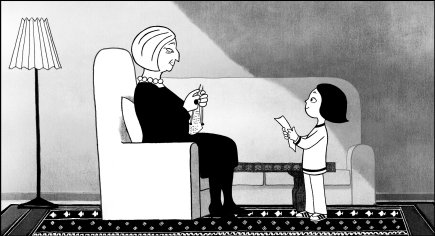 Did it ever occur to you that you'd be doing voices for this?
Did it ever occur to you that you'd be doing voices for this?
Catherine Deneuve: No way. When I heard about the film I said it was
a great idea, of course. But I haven't heard anything before I read the
book.
You've worked with every sort of director, what was different or similar
to doing this animated feature, as opposed to playing a real character?
Chiara Mastroianni: I find that it's the same. The script was really
written like a script for film. At times you forget that it would be
animated. Also the fact that it's just a voice it is very interesting
because you have a freedom physically that you have less when you're on
screen. Marjane directed you like she's directed actors all her life. She
was very good at it and very good at acting as well. What happened was
this... We recorded voices, different voices, not together. No actors were
working together and she was playing all the characters. I wish we had some
images from that because it was a really funny moment. And she was really
good at it. It didn't feel very strange.
Catherine Deneuve: I think it's different when you only do the voice
because having the freedom of not being physically involved, [it's] just
standing in front of the microphone in a dark room. In a way you have to get
over it. I don't want to exaggerate things, but you really have to stylize
what you are doing because you know it's going to be just with the voice.
Chiara Mastroianni: But still it's a true story and even if it's
animated, it's very realistic. It's [not] like she's playing a squirrel and
I'm playing a duck...
Catherine Deneuve: I'd love that [both laugh].
Chiara Mastroianni: Next time, next time. You know you don't fall
into doing bizarre things. The acting itself, the way you talk, is exactly
the same as you would talk on film. You don't have to invent a different
voice.
Catherine Deneuve: So that's it.
What did you do to bring your characters to life? Did you prepare?
Catherine Deneuve: I didn't prepare.
Chiara Mastroianni: We don't prepare that much [laughs]. This
is France. This is Europe...
Catherine Deneuve: We prepare for films, but you just have to
concentrate when you play the mother for Marjane in Persepolis.
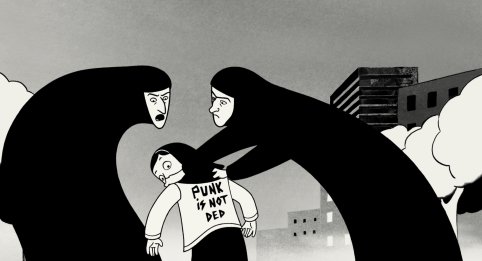 What attracted you to doing this sort of film, as opposed to a
live-action feature?
What attracted you to doing this sort of film, as opposed to a
live-action feature?
Catherine Deneuve: I was very excited because I thought it was a very
original project.
Chiara Mastroianni: It had been a long time that you had wanted to...
Catherine Deneuve: Yes, I wanted to do a voice for years. An
animation film for a long time, yes. My agent knew that so when he heard
about the film, he told me about it. I just wanted to be involved. I think
it's funny for actors to have to play a voice.
What attracted you to the story?
Catherine Deneuve: It was the whole project. I knew the book. When
you know the story and you have been involved with it for a long time...I
wanted to be part of it, that's it. That was really the major reason.
One of the problems with animation is that you don't get to interact with
the other actors. When making this film, did you talk about how the
characters should act with one another?
Chiara Mastroianni: No, never. It's actually strange. When I saw the
film finished, that’s when I realized that we didn't act together. It struck
me at the moment because when I saw it, I felt that everyone was really
working together. That's so crazy.
Catherine Deneuve: That's the miracle.
Chiara Mastroianni: It never crossed my mind that we didn't work
together. I was in the studio alone with Marjane. You just have the feeling
that it's a puzzle and everything went along really well.
Catherine Deneuve: If you don't know it, you cannot think about it.
You've both seen the finished product; are you satisfied?
Catherine Deneuve: Yes, very much so. It was very moving, very
political in a good way.
What would you like this film to convey about the lives of women?
Catherine Deneuve: Well I'm sure a lot of people have no idea what it
must like to be in Iran, especially for women. The film says a lot. It's a
political film. And it's an animation film. It can bring a different
audience that only an animation film can bring. And I like that fact. The
fact that it is very touching sometimes, but the film is quite funny.
Chiara Mastroianni: With the media nowadays – especially since
September 11th, 2001 – there's sort of a concept of these countries being
scary. No one tries to think about what other perspectives the country may
represent. What I think Marjane wanted to show in this film, by talking
about the everyday life of one little girl, is to get you in touch with the
issues that are very important. These are people just like you and me. They
dance, they fall in love and they experience heartbreak. Through the media,
there's always a story about a bomb that exploded and 3000 people [who were
killed or hurt]... It's shocking but there's no reality to it. Of course
it's shocking when you hear about it. People tend to forget. Marjane was
telling me that when she arrived in Europe, people were asking her whether
he father drove a horse. It's all these preconceived ideas. She wanted to
show in the film that there are human beings in the country and you have to
forget about the other thought because it's scary. It's not always about
Iran. The media always brings things out like a concept, but nothing beyond
that.
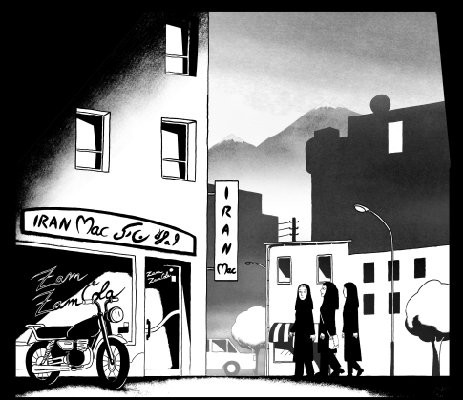 In America, the Oscars are such a big deal. What do you feel about
awards? Do you care about such things?
In America, the Oscars are such a big deal. What do you feel about
awards? Do you care about such things?
Catherine Deneuve: I think it can be very different for European
films. If you get an Oscar, you get a different kind of distribution,
especially in the States.
The reviews for Persepolis [have been] great. People are ecstatic
about it. You [are] headed for Hollywood at least for that night.
Catherine Deneuve: It would be wonderful if the film was chosen by
Americans to represent France at the Oscars.
Chiara Mastroianni: Persepolis has been an adventure from the
beginning. It was produced by two people. It's their first production. In
the beginning, no one really believed – like "What? Black and white?"
[laughs] But little by little, the thing started to grow. Marjane and
Vincent are like soldiers. There's one thing that they are very proud of is
that they made the film they wanted to make without compromise. What
happened after making the film, going to Cannes, winning a prize, [getting
an Oscar nomination]. All these fantastic things that happened; it’s like
going to one adventure to another. Three years ago when we started this
project, would we imagine ourselves to be sitting here? It's a special
experience. Until now it's been great. But we've been very lucky.
Speculating on getting a prize and all that, we have to wait and see, we
have to wait until [February]. Persepolis has been chosen to
represent France. But, me being Italian, I am a bit superstitious...
Catherine Deneuve: I'm not superstitious; I think it would be a great
thing for the distribution of the film. It would be great...
Chiara Mastroianni: I'm not saying that I don't want it to happen...
Catherine Deneuve: You're just saying you don't want to talk about it
happening, because you're superstitious...
Chiara Mastroianni: Yeah and I don't want to pick a dress now
[both laugh].
Loving movies so much, were you ever tempted to move to Hollywood at all?
Catherine Deneuve: No, because nothing ever was proposed that was
interesting enough. I think it would have been difficult to move in
Hollywood. I wasn't going to go to move and get a part that was less
interesting, into an English speaking film, than what I would be offered in
Europe.
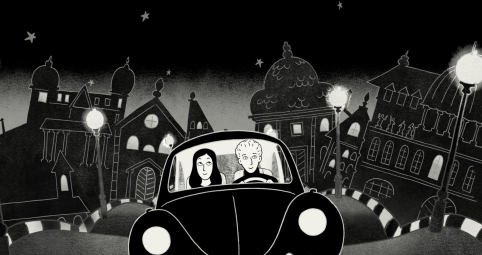 Have you ever thought of moving here?
Have you ever thought of moving here?
Chiara Mastroianni: Well I wish it would be possible to work here
without moving here. I love cinema, but I don't think moving…. When I read a
script, I don't look if its Italian, American, or French, I just see if it
relates to me. And then I would want to do it. Very rarely I had
opportunities to work in America, in independent films, produced by the
French. I don't have an experience of Hollywood of all. I would love to, but
you have to be realistic about it.
Catherine Deneuve: Yes, if you are not an English-speaking actress,
it is very rare to see a European actress in an American film.
A lot of the directors you've worked with defined certain styles. Of the
people you've worked with, who influenced you in your acting?
Catherine Deneuve: It was not a question for me about how I changed
my acting, it was more about growing. Growing. I started to do films very
young. The fact that I met Jacques Demy at a very early age, I learned
things with him. I wouldn't say I've changed my mind. At the time I was very
young, I was involving and learning at the same time. I haven't changed much
since I was 18 or 20 – as a moviegoer.
Who were your favorite directors that you've worked with?
Catherine Deneuve: I've done different films with Arnaud Desplechin
and I am actually working with him on a project [that's coming out this
year, Un conte de Noël]. I feel very [strongly about] with him. I
think we are always going on doing something together, [we're always]
digging in the same direction.
Chiara Mastroianni: I think Arnaud Desplechin was very important to
me because I was looking to meet him when I first started. So he's someone
very important to me too. I like people who have a very personal point of
view and just bring you into his own world. I would say definitely that
Arnaud for me is the "captain of the boat."
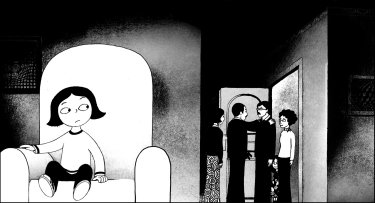 What is that difference between Hollywood and Europe in the way they make
movies?
What is that difference between Hollywood and Europe in the way they make
movies?
Catherine Deneuve: I'm not sure. I don't have that much experience in
Hollywood to compare. I think the difference is that in America, the
producer is almost as important as the director in making the film. And it
can be not so good for the film. I find that having the director completely
alone to do exactly what he wants can be good. There are advantages in
making films in America, with many people working on the script, having many
people to help direct... Sometimes the result is too conventional, but
sometimes the result is wonderful. I think personal films are interesting,
[having] the personal view of the director. But sometimes I also think a
film suffers without the producer's influence, without more concentration on
production. So it's always a mix of both.
Do you want to help upcoming actors or directors, maybe produce in the
future?
Catherine Deneuve: No, no I'm not there to help. When I do a film, I
do it because I think the story is interesting. I don't want to take a
chance of working with someone I don't know. It's not a matter of help. I
love cinema, and I want to take opportunities to make a story come onto
screen. I don't like the idea of taking a project just because "it would be
good for them."
Chiara Mastroianni: You're talking about production, and that's
something that happens more over here, rather than France. The production
aspect in France – there are many actors becoming directors, but it’s not
like here.
Have you ever visited Iran in your career?
Catherine Deneuve: No, not yet. And I don't think it's going to be
anytime soon before I can go there [laughs].
I don't think anyone can go there.
Chiara Mastroianni: Well going there [isn't the problem]. It's coming
back that can be a problem.
Catherine Deneuve: No, I think you can go but be aware of so many
things you cannot do or say, or what.
Is there a place in the world where you wouldn't be recognized?
Catherine Deneuve: That would be something very appealing [laughs].
It reminds me of when I went to Vietnam for the first time. I felt something
very special walking in the street, with no one knowing you. They've never
seen a European or French film.
Email
us Let us
know what you
think.
Features
Return to the features page.